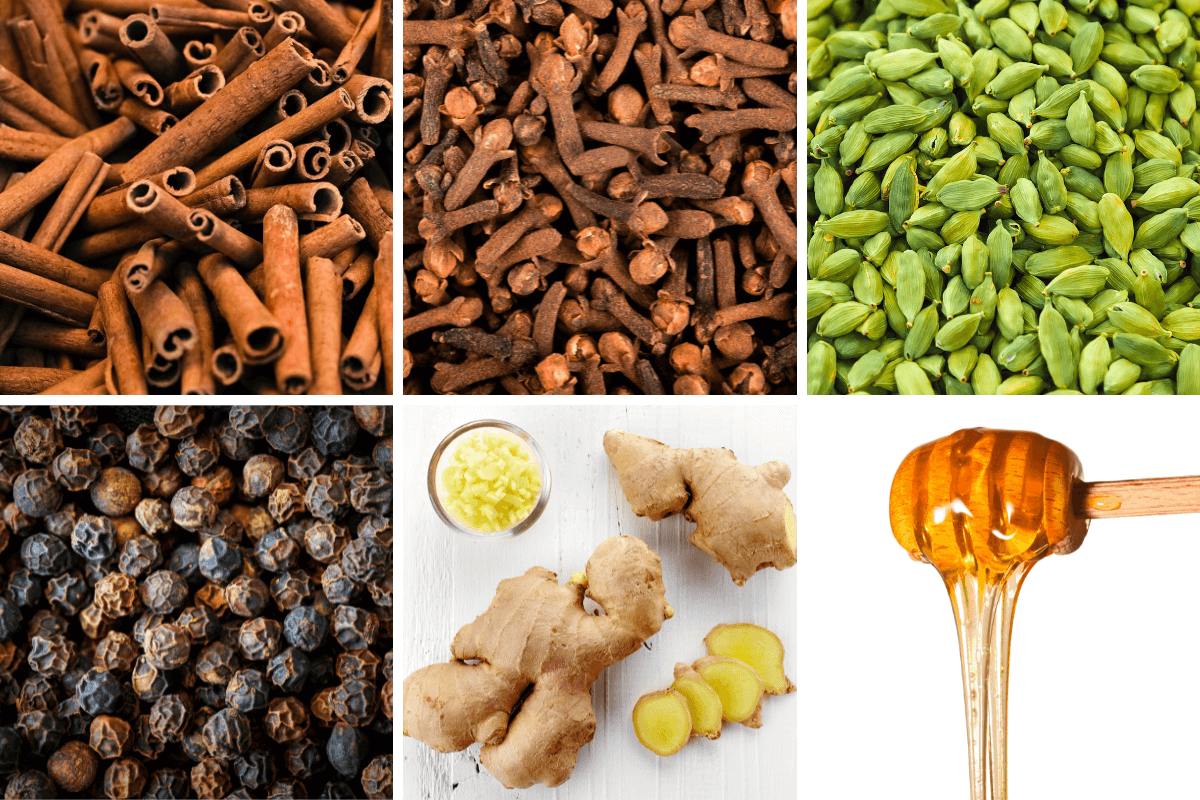My Homemade Yogi Tea Recipe For Optimal Health
Adding some hot tea into your practice is a great way to calm the nervous system. Enter your original yogi tea recipe. No, I’m not talking about the brand Yogi Tea created by Yogi Bhajan. I’m talking about a whole tea recipe, rooted in Ayurveda. So roll out your yoga mat because this traditional yogi tea will take you back to your yoga teacher training days.
This simple drink can be life-changing, so drink up and enjoy!
What Is Yogi Tea?
Rooted in ancient Indian wisdom, this spiced tea is a therapeutic infusion that harmonizes with the fundamental principles of Ayurveda, aiming to balance the body’s energies. Infused with a blend of warming spices such as cinnamon, cardamom, black pepper, and ginger, Yogi tea not only tantalizes the taste buds but also serves as a ritualistic companion to yoga practices. The practice of using this tea gained popularity in the West from the teachings of Yogi Bhajan in the 1960s.
This aromatic concoction is more than just a comforting drink; it symbolizes a journey toward holistic well-being, uniting the ancient wisdom of Ayurveda with the timeless practice of yoga.
Is Yogi Tea Good For You?
As part of an ayurvedic diet, this delightful warming beverage promotes optimal health, not just physical health, but even mental health as well. This aromatic tea brings your nervous system into balance and brings you a harmonious blend of fragrant herbs and spices that transports you to a place of tranquility. Yogi tea is more than a beverage—it’s a moment of indulgence and relaxation. Whether enjoyed alone for a quiet escape or shared with friends, this aromatic tea becomes a delightful companion, adding a touch of warmth and flavor to your daily diet and helping to balance doshas. It becomes a type of self care ritual.
Yogi Tea Benefits
Just like Kundalini yoga, Yogi tea has properties to boost your immune system and help your body take great preventative measures against illness and lethargy. That is because this delicious tea aids digestion, boosts metabolism, and provides a natural energy lift. The therapeutic properties of the spices align with Ayurvedic principles, aiming to balance the body’s energies and promote optimal health.
Each of the spices you include in your traditional yogi tea has its health benefits. When you add them all into a large pot for a big batch of yogi tea the benefits combine into the perfect comforting drink.
- Ginger: Well-known for its anti-inflammatory properties, ginger can help alleviate various forms of pain and discomfort. Herbs in the ginger family are often used to ease nausea, making it a natural remedy for morning and motion sicknesses. Ginger is a digestive aid, promoting healthy digestion and helping to reduce bloating and indigestion.
- Cinnamon sticks: This aromatic spice is rich in antioxidants, which play a role in protecting cells from damaging molecules. Incorporating the cinnamon sticks into your yogi tea recipe will increase the regenerative and protective properties of the tea. Cinnamon rules!
- Cloves: A Champion spice, clove is one of Mother Nature’s premier antiseptics. Also, a “potent anti-viral agent” clove has long been celebrated for its ability to combat harmful microbes, supporting gut health and supporting the immune system. If you add cloves to your yogi tea recipe, your immune system will thank you!
- Green Cardamom pods: Cardamom is embraced for its dual role in supporting respiratory health and enhancing mood through its pleasant aroma. This versatile spice boasts anti-inflammatory compounds that support joint health too!
- Black peppercorns: Piperine from Black pepper acts as a silent anti-inflammatory warrior, soothing the body. Beyond this, it may boost metabolism, aiding mindful weight management. Yet, black pepper’s magic extends further, harmonizing with other spices to enhance assimilation and create a holistic, flavorful experience for body and soul. Sip, savor, and let the black pepper in Yogi tea weave its wellness magic into your yoga journey.
Make your yoga practice 2x more potent in HALF the time (usually $47) FREE 👇
How To Make Yogi Tea
Now that you know all the backstory of this perfect drink, grab your pot and let’s get this recipe started!!
Yogi Tea Recipe Ingredients
- Pot of water
- 1 fresh ginger root (peeled and sliced)
- 2 cinnamon sticks
- 20 whole cloves
- 25 whole green cardamom pods (split pods)
- 25 whole black peppercorns
Optional:
- Black tea bag or green tea bag
- Cow’s milk, oat milk, or almond milk
- Sweetener (Sugar, Maple syrup, or Local honey!)
Yogi Tea Recipe Instructions
- Crush the cardamom pods slightly to release their flavor and break the cinnamon sticks into a few pieces.
- In a large pot, bring the two quarts of water to a boil.
- Once boiling, add the cinnamon sticks, cardamom, cloves, ginger, and black peppercorns.
- Reduce the heat and let the spices simmer for two to three hours. Allow the flavors to meld, creating a fragrant and aromatic infusion.
- If you partake in caffeine you may now add black tea to your pot. Alternatively, you could add a green tea at this stage for a different flavor and caffeine type.
- Allow 5 minutes for the tea bags to soak in the yogi tea. Remove the tea bags and strain the tea to remove the spices. You can use a fine mesh strainer or cheesecloth for this step.
- Sweeten the tea with your preferred sweetener. My favorite choice, honey! Bonus points for local honey.
- Add milk if you like to create a creamier flavor. If you don’t drink cow’s milk, try oat milk or almond milk.
- Pour the single serving of Yogi tea into your favorite mug or cup. Optionally, garnish with a cinnamon stick for presentation.
Take a moment to savor the rich aroma and taste. Allow the Yogi tea to become a ritual. Take a mindful pause to enjoy its heat and potential holistic benefits.
Check out my traditional yogi tea tutorial on Tiktok for how I make my delicious yogi tea.
Yogi Tea Side Effects And Risks
Everything comes with side effects and risks. So always check with a health professional before making changes to your routines.
- Allergies: Yogi tea contains a blend of spices, and individuals with known allergies to ingredients such as cinnamon, ginger, or cardamom should exercise caution. Check the ingredient list to ensure it aligns with your dietary needs.
- Pregnancy: Certain herbs and spices in Yogi tea, such as ginger, may have varying effects during pregnancy. Pregnant individuals should consult with their healthcare provider before consuming Yogi tea to ensure it aligns with their specific health circumstances.
- Digestive Sensitivity: Some people may experience digestive discomfort, especially if they are not accustomed to the warming spices in Yogi tea. Starting with a smaller quantity and gradually increasing intake can help mitigate potential digestive issues.
- Blood Pressure and Medications: Certain spices in Yogi tea, like licorice, may impact blood pressure. Individuals with hypertension or those taking medications should consult with their healthcare provider, as the tea may interact with certain medications.
- Caffeine Sensitivity: Yogi tea may contain caffeine if black tea is included in the blend. Individuals sensitive to caffeine should be mindful of their overall intake, especially if they consume multiple servings throughout the day.
- Individual Reactions: Each person’s body reacts differently to herbs and spices. If you notice any adverse reactions, such as allergic symptoms, digestive discomfort, or unusual sensations, discontinue consumption and seek medical advice.
Closing Thoughts
The next time you go to reach for a cup of coffee, pause and consider a steaming cup of Yogi tea instead. You will find not just a beverage but a holistic journey towards well-being.
From the warming spices that dance on our taste buds to the ancient wisdom woven into each aromatic sip, Yogi tea becomes more than a ritual—it’s a mindful pause, a celebration of balance, and a connection to centuries of herbal wisdom. As you sip, you invite the magic of cloves, cardamom, ginger, and more into your lives, each ingredient a storyteller in the tapestry of health and harmony. Yogi tea is a reminder that self-care can be a simple, daily ceremony—one that nourishes not only the body but also the soul. So, let’s continue to steep in the wisdom of Ayurveda, the teachings of yoga, and the soothing warmth of Yogi tea, savoring the journey sip by sip. May each cup be a moment of mindfulness, a blend of flavors that resonates with the symphony of life.
If you adore this yoga tea recipe you will love the yogic cleanse. If that’s not enough, my Yoga For Self Mastery program helps you discover optimal health benefits for you and what will help you be your best self, join me will you?
Next Steps
- If you’re interested in practical kriya yoga as a way to improve your daily life and relationships, check out my Yoga for Self Mastery course.
- Order my Yoga Life book for a practical guide to creating balance in your life through yoga.
- Check out my YouTube channel and find some yoga classes that you can try out for yourself!















